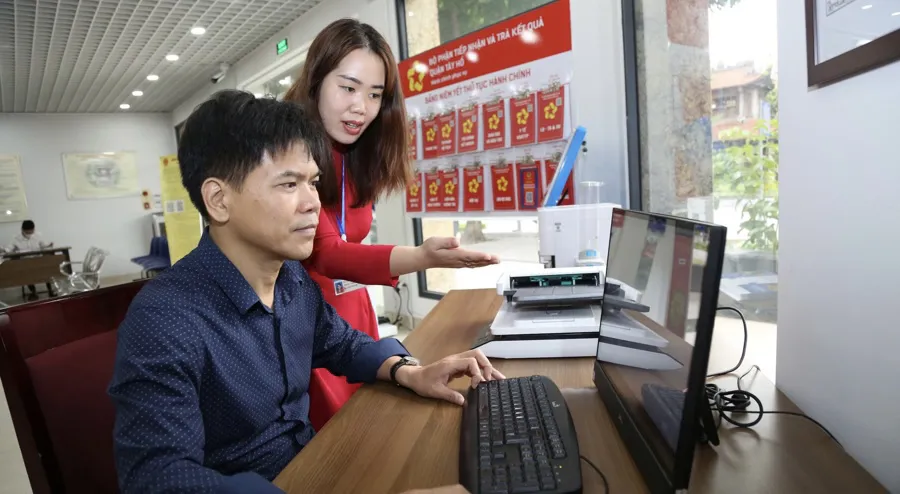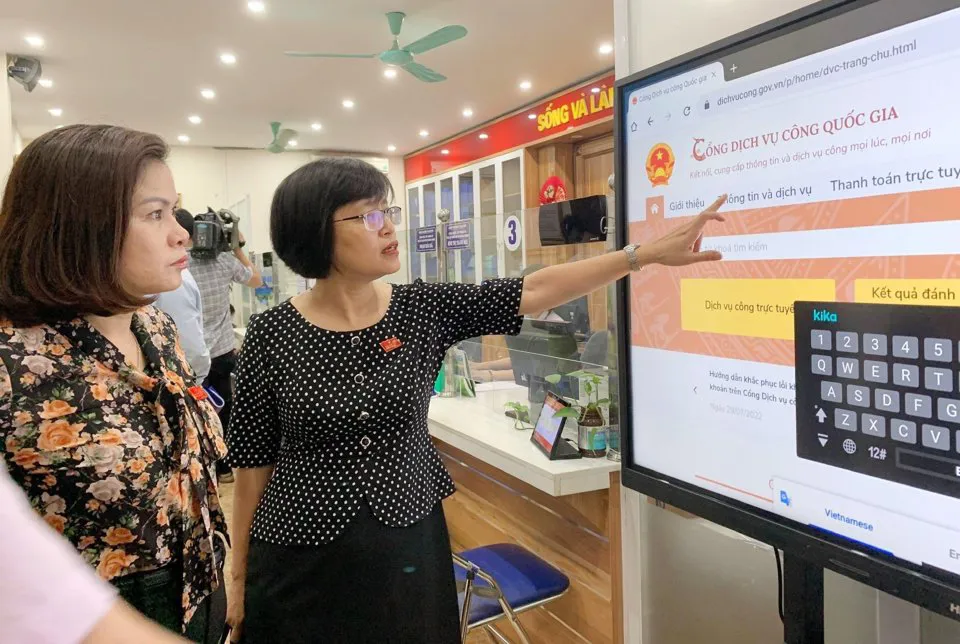Hanoi digital government – new mindset to serve people
Hanoi’s unified approach reflects its determination to lead the nation in digital transformation, fostering a forward-thinking and innovative environment that aligns with global trends and is responsive to local needs.
A pioneer in administrative and digital transformation, Hanoi is leveraging digital technology to enhance convenience for citizens and businesses, showcasing a government focused on action and service.
Key tasks
| Locals are instructed to perform administrative procedures online at Tay Ho District. Photo: Thanh Hai/The Hanoi Times |
Digital transformation is an inevitable trend in the context of global integration, particularly with the far-reaching influence of the Fourth Industrial Revolution.
Hanoi is no exception to this trend. The Resolution of the 17th Party Congress of Hanoi identifies a breakthrough in the development of digital infrastructure, information technology, and data infrastructure. These are to be interconnected, synchronized, and unified to lay the foundation for the digital economy and digital society. At the same time, Hanoi continues to focus on improving institutional frameworks, mechanisms, and policies to complete the construction of e-government and move towards a digital government.
Aware of the importance of this strategic breakthrough, the Hanoi Party Committee and the People’s Committee have issued several resolutions, programs, and plans to drive substantial progress in digital transformation and the development of digital governance.
On December 30, 2022, the Hanoi Party Committee released Resolution No. 18-NQ/TU on digital transformation and the development of a smart Hanoi by 2025, with a vision to 2030. Earlier, on September 6, 2021, the People’s Committee approved Decision No. 4098/QĐ-UBND outlining the city’s digital transformation program for the same timeframe.
Chairman of the Hanoi People’s Committee Tran Sy Thanh said that Hanoi is committed to a flexible and creative implementation of digital transformation aligned with the national program for digital transformation by 2025, as set out in the Government’s Project 06.
This project focuses on developing applications related to citizen data, electronic identification, and authentication to serve the national digital transformation from 2022 to 2025, with a vision to 2030.
According to Thanh, the city has identified five core areas for digital transformation: resolving administrative procedures and providing online public services; fostering socio-economic development; promoting digital citizenship; enhancing the ecosystem for utilizing and enriching citizen data; and supporting leadership and governance at all levels. Additionally, Hanoi has set clear objectives, indicators, and responsibilities for various sectors, localities, and political organizations.
"If leadership does not consider digital transformation as a matter of survival, it cannot be achieved. The idea that only IT staff can lead digital transformation is wrong; it reflects a flawed approach," said Thanh. This recognition has catalyzed a significant shift in perception and action across all levels and sectors of the city’s administration.
Currently, the entire political system in Hanoi is actively engaged in digital transformation, acknowledging its central role. Efforts are focused on the application of information technology to reform administrative procedures, enhance governance efficiency, and improve competitiveness. For instance, Dan Phuong District issued Resolution No. 28-NQ/HU on December 20, 2021, to advance IT applications and digital transformation in governance and public service delivery through 2025. Following this, the district’s People’s Committee issued Plan No. 55/KH-UBND in February 2022, which sets out detailed measures for digital transformation. Local agencies, departments, and communities have also formulated and executed their plans, driving a significant transformation in governance and improving the quality of life for residents.
“The district’s approach places citizens and businesses at the center, positioning them as both beneficiaries and contributors to digital transformation. This ensures that they gain more convenient, faster, and more efficient access to public services and social utilities, creating resources for further development,” said Tran Duc Hai, Secretary of the Dan Phuong District Party Committee.
In Thanh Oai District, the People’s Committee adopted Plan No. 210/KH-UBND on August 10, 2022, to enhance IT applications, develop e-governance, and ensure cybersecurity through 2025.
Vice Chairman of the district’s People’s Committee Vu Quynh said the community digital transformation teams guide residents in utilizing digital platforms and online public services. Information is disseminated through social media, district and commune websites, Zalo official accounts, and Facebook pages, ensuring accessibility and inclusivity, said Quynh.
| Performing online administrative services at Dong Da District. |
Pioneering role
As highlighted by city leaders, Hanoi’s digital transformation efforts prioritize citizen satisfaction as the ultimate goal of administrative reforms. This vision is driven by three principles: respect for the law, active listening, and a service-oriented attitude. The city also pursues six objectives: comprehensive awareness, long-term vision, creative thinking, intelligent solutions, decisive action, and tangible outcomes.
Chairman Thanh affirmed that following the Prime Minister’s approval of Project 06, Hanoi recognized its critical importance in building a digital government. The project is seen as a “breakthrough within a breakthrough” that serves as a strategic driver for Hanoi’s robust and sustainable development.
To streamline coordination and execution, Hanoi has merged three committees—Administrative Reform, Digital Transformation, and Project 06—into a single unified body led by the city’s chairman. A joint working group has been established to provide cohesive support for all three areas, underscoring the city’s commitment to clear roles, processes, and accountability. This integration embodies the spirit of “Capital’s thinking, Hanoi’s actions,” ensuring seamless coordination and effective implementation.
Hanoi’s unified approach reflects its determination to lead the nation in digital transformation, fostering a forward-thinking and innovative environment that aligns with global trends while addressing local needs.
During a working session with Hanoi's leadership on August 9, 2024, General Secretary To Lam emphasized the importance of fully recognizing the exceptional advantages, outstanding potential, and strategic position of Hanoi in the nation's socio-economic development. He urged Hanoi to enhance its dynamism and creativity, continuing to innovate its mindset to drive stronger growth. The goal is to establish Hanoi as a model city for the country, exemplifying rapid and sustainable development that harmonizes economic progress with cultural values, environmental protection, public safety, and the happiness of its citizens. "The government always holds high hopes, delegates responsibilities, and places confidence in Hanoi's role in implementing socio-economic development programs, especially as a pioneer in digital transformation and green development. These efforts aim to bring tangible benefits to residents and businesses, contributing to the growth of the capital—a city that serves as the heart of the nation, a capital for the country, and a country for the capital," Prime Minister Pham Minh Chinh. |












